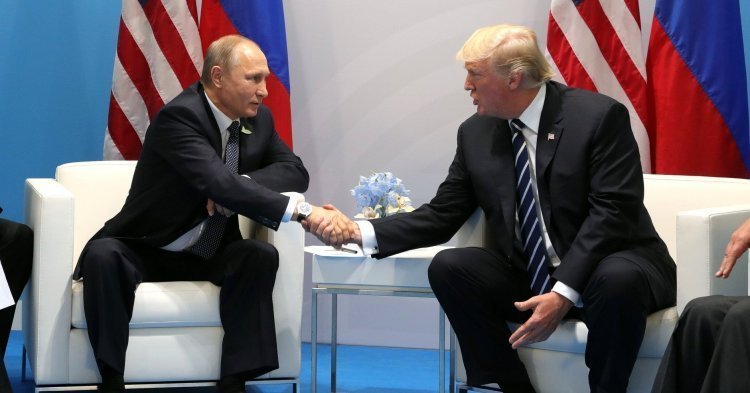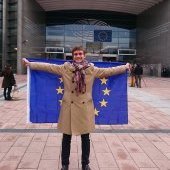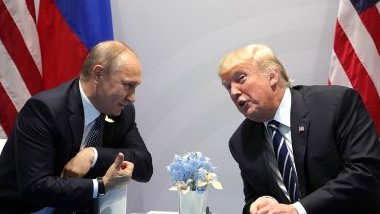A summit meeting
It was after a week of confrontations in Europe that Donald Trump met his Russian counterpart who was strengthened by the image of a welcoming Russia that organised the World Cup. Nonetheless, even if Russia’s image has changed a little in the eyes of international media, the gains in the diplomatic field remain small. This is despite the fact that this meeting, whose subjects were Russo-American relations and the wars in Syria and Ukraine, reached a conclusion that was more than favourable to the Russian government.
Some might ask why Helsinki was selected as the location for such a meeting. As was explained on The New Federalist earlier, Helsinki is a natural location for meetings between Americans and Russians. Nevertheless, while Obama’s diplomacy regularly incorporated European diplomacy in its relations with Russia, this “tradition” now seems broken.
European diplomacy: A role to play
During this saga in the Land of a Thousand Lakes, the only European voice to speak was Sauli Niinistö, the Finnish President. Even though silence is golden in Finnish culture, the EU, the crossroads of two worlds, has its word to say about the topics tackled in this summit. The willingness of the two superpowers to wipe out the European Union can’t be met with “Finlandisation” - ‘expression referring to the influence that a powerful country can have on the foreign policy of a smaller neighbour’ - of the fragile European diplomacy.
This summit demonstrates, in part, that the mission of European diplomacy should be to act as a mediator.
To come back to last week’s events, Donald Trump was in Brussels on 11 and 12 July for the NATO summit. The American leader stated on social media that “Many countries in NATO, which we are expected to defend, are not only short of their current commitment of 2% (which is low), but are also delinquent for many years in payments that have not been made. Will they reimburse the U.S.?” He continued by repeating that ‘Germany is making Russia richer. It’s a prisoner to Russia. Germany is totally controlled by Russia.’ Astonishingly, the EU could respond with one voice, with Donald Tusk retorting that ‘America and the EU are best friends’.
Despite these schoolkid-like verbal exchanges initiated by the American President, the EU is attached to its special relationship with the USA. However, this close link seems more and more threatened as Donald Trump keeps tweeting. Recently, he characterised Europeans as “enemies”, in same terms as the Chinese and the Russians. This less-than-flattering characterisation can be explained by the trade war begun by the Americans, and by the debates concerning NATO. The hostility of President Trump towards the EU can also be explained by the political and economic differences between the two continents, and by European opposition to American policy that marginalises its traditional allies for the benefit of authoritarian regimes. Finally, discord between the two also stems from the American withdrawal from the Iran nuclear deal which greatly harmed the economic revival of the country, from which European companies benefited.
The EU has to determine a diplomatic axis. In public, the adopted strategy seems to be one of disinterest towards this American-Russian summit. Physically, this is expressed by the absence of European representatives, as Donald Tusk and Jean-Claude Juncker were on a diplomatic visit in Asia and Federica Mogherini discussed with her Libyan counterparts. In reality, European indifference may be explained by the necessary protection of European interests: development of commercial links in Asia and reinforcing its cooperation with the Maghreb in the field of controlling immigration.
The marginalisation of the EU and the necessity of developing its diplomacy
Following the aforementioned 16 July summit, the head of the American government affirmed that he believed President Putin’s account of the accusations concerning Russian interference in the 2016 presidential election. This statement shocked Washington since it contradicted the findings of American intelligence services’ investigations.
While Trump’s diplomacy seemed subjugated to the whims of a businessman who became head of state, Vladimir Putin succeeded at extending Russian hegemony in global diplomacy. A new axis now seems to be forming. Even though Europeans wish to preserve close links with Americans, as President Trump is fond of destruction, the EU seems to be turning towards its Asian, notably Chinese and Japanese colleagues. The reasons behind this warming of relations are precisely economic, in the face of American protectionism. The Europeans’ objective is to open their internal market to the world and to create strong and stable relations, in order to strengthen Europe’s diplomatic and economic influence.
In conclusion, the EU, a sui generis politico-economic alliance, has for many years sought to develop its diplomacy. The Treaty of Lisbon (2007) introduced a High Representative of the Union for Foreign Affairs and Security Policy. This position allows for a common representation of all the member states. However, the member states are free to manage their own foreign relations. This competence, coupled with political or almost ideological differences that member states have towards European actors, leads to grave internal disagreement. The immediate consequence is the fact that European diplomacy appears incoherent.
From now on, Europeans marginalised by their American ally have to ally with new partners. Thus, the EU-Japan free trade deal, dubbed historic, illustrates the Old Continent’s will to build new diplomatic bridges, particularly in Asia, the continent that is little by little becoming the new global centre of gravity.




Follow the comments: |
|
